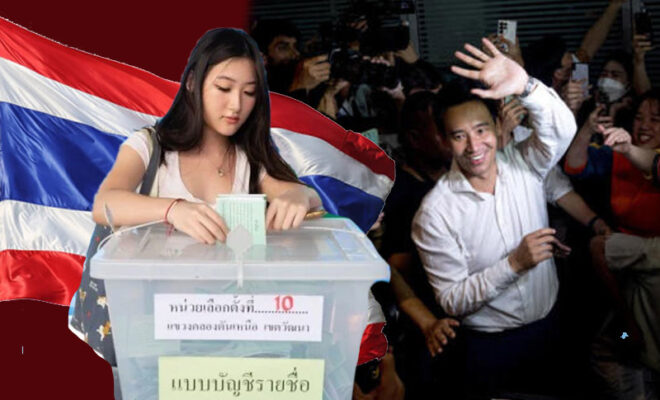Thailand’s Opposition Wins As Voters Reject Military-Backed Government

Thailand voters might also be aware of Military coups in countries like Pakistan & Afghanistan. Thus they preferred to choose the opposition party.
Thailand’s recent election has delivered a stunning victory for the opposition parties, as voters decisively rejected the parties aligned with the military, signifying a strong desire for change after almost a decade of conservative, army-backed rule.
The liberal Move Forward party and the populist Pheu Thai Party emerged as the clear frontrunners, though forming the next government remains uncertain due to parliamentary rules favoring the military, which were established after the 2014 coup.
To assume power, the opposition will need to navigate complex negotiations and secure support from multiple factions, including members of the junta-appointed Senate, which has historically sided with military parties.
The election outcome represents another chapter in the long-standing power struggle between Pheu Thai, associated with the influential Shinawatra family, and a coalition of old money, conservative forces, and the military establishment that has influenced the country’s institutions throughout periods of unrest.
However, the remarkable performance of the Move Forward party, buoyed by the support of young voters, poses a significant challenge to Thailand’s establishment and ruling parties.
With its platform centered around institutional reforms and dismantling monopolies, Move Forward garnered considerable support, particularly in the capital city of Bangkok.
Preliminary results indicate that both Move Forward and Pheu Thai are poised to win more than triple the number of seats compared to the junta’s political vehicle, Palang Pracharat, and the army-backed United Thai Nation party.
Move Forward’s leader, Pita Limjaroenrat, expressed his party’s commitment to its values while forming a government, highlighting its opposition to dictator-backed and military-aligned parties.
While open to an alliance with Pheu Thai, Limjaroenrat also aspires to become the country’s prime minister, emphasizing the overwhelming support his party received from people across Thailand.
The election results constitute a significant blow to the military and its allies. However, given their influence and parliamentary advantages, they may still have a role to play in the government formation process.
Prime Minister Prayuth Chan-ocha, a retired general who led the previous coup, campaigned on the platform of continuity, warning against potential conflicts that could arise from a change in government.
The rejection of the army-backed government by Thailand’s voters marks a crucial moment in the country’s political landscape.
Move Forward’s surge, fueled by calls for institutional reform, illustrates a shifting paradigm in Thai politics.
Also Read:- FM Nirmala Sitharaman On 2-Day Visit To Japan For Crucial G7 Meeting
While Pheu Thai focused on a populism narrative that it had already won, Move Forward elevated the discourse by prioritizing institutional reforms as the new battleground for political change in Thailand.



